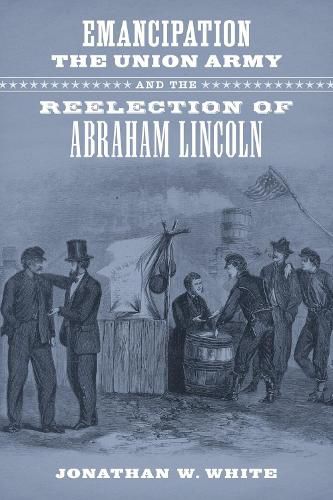Readings Newsletter
Become a Readings Member to make your shopping experience even easier.
Sign in or sign up for free!
You’re not far away from qualifying for FREE standard shipping within Australia
You’ve qualified for FREE standard shipping within Australia
The cart is loading…






This title is printed to order. This book may have been self-published. If so, we cannot guarantee the quality of the content. In the main most books will have gone through the editing process however some may not. We therefore suggest that you be aware of this before ordering this book. If in doubt check either the author or publisher’s details as we are unable to accept any returns unless they are faulty. Please contact us if you have any questions.
The Union army’s overwhelming vote for Abraham Lincoln in the 1864 presidential election has led many Civil War scholars to conclude that the soldiers supported the Republican Party and its effort to abolish slavery. In Emancipation, the Union Army, and the Reelection of Abraham Lincoln, Jonathan W. White challenges this reigning paradigm in Civil War historiography, arguing that the army vote is not a reliable index of ideological motivation or political sentiment. Although 78 percent of soldiers cast ballots for Lincoln, White contends that this was not due wholly to a political or social conversion to the Republican Party. Rather, he cites previously ignored mitigating factors such as voter turnout, intimidation at the polls, and soldiers’ choices in other elections that same year.
While recognizing that many in the military changed their views on slavery and emancipation during the war, White suggests that a considerable number of soldiers who voted for Lincoln still rejected the Republican platform or disagreed with his views on slavery. For them, like many northerners, a vote for the Democratic ticket was considered to be treasonous and an admission of defeat. Using previously untapped court-martial records from the National Archives, as well as manuscript collections from across the country, White convincingly revises many commonly held assumptions about the Civil War era and provides a deeper understanding of the Union army.
$9.00 standard shipping within Australia
FREE standard shipping within Australia for orders over $100.00
Express & International shipping calculated at checkout
This title is printed to order. This book may have been self-published. If so, we cannot guarantee the quality of the content. In the main most books will have gone through the editing process however some may not. We therefore suggest that you be aware of this before ordering this book. If in doubt check either the author or publisher’s details as we are unable to accept any returns unless they are faulty. Please contact us if you have any questions.
The Union army’s overwhelming vote for Abraham Lincoln in the 1864 presidential election has led many Civil War scholars to conclude that the soldiers supported the Republican Party and its effort to abolish slavery. In Emancipation, the Union Army, and the Reelection of Abraham Lincoln, Jonathan W. White challenges this reigning paradigm in Civil War historiography, arguing that the army vote is not a reliable index of ideological motivation or political sentiment. Although 78 percent of soldiers cast ballots for Lincoln, White contends that this was not due wholly to a political or social conversion to the Republican Party. Rather, he cites previously ignored mitigating factors such as voter turnout, intimidation at the polls, and soldiers’ choices in other elections that same year.
While recognizing that many in the military changed their views on slavery and emancipation during the war, White suggests that a considerable number of soldiers who voted for Lincoln still rejected the Republican platform or disagreed with his views on slavery. For them, like many northerners, a vote for the Democratic ticket was considered to be treasonous and an admission of defeat. Using previously untapped court-martial records from the National Archives, as well as manuscript collections from across the country, White convincingly revises many commonly held assumptions about the Civil War era and provides a deeper understanding of the Union army.